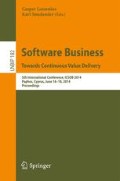Abstract
Service portfolio planning is the process of designing collections of services and deciding on their provision. The problem is highly information and decision centric. In this paper, we present a solution approach called Analytical Open Innovation (AOI). Open innovation facilitates comprehensive crowdsourcing and social media information analysis. In our proposed approach (AOI), open innovation is utilized for the elicitation of service needs, the definition of quality provision levels for each of the services, and detection of service dependencies and cost and value synergies. As the result of a rigorous optimization process, diversified and resource-optimized service portfolios are created. As a proof of concept, the proposed approach is illustrated via a case study project using Over the Top TV (OTT) services to be offered at different levels of quality over four quarters of a year.
Access this chapter
Tax calculation will be finalised at checkout
Purchases are for personal use only
Preview
Unable to display preview. Download preview PDF.
References
Lovelock, C., Wirtz, J.: Services Marketing: People, Technology, Strategy. Prentice Hall, Upper Saddle River (2007)
Strategic Research Agenda Need for Speed (2013), http://www.digile.fi/Services/researchprograms/futureprograms
Rometty, V.M.: A Conversation with Ginni Rometty (2013), http://www.cfr.org/technology-and-science/conversation-ginni-rometty/p30181
Enkel, E., Gassmann, O., Chesbrough, H.: Open R&D and open innovation: exploring the phenomenon. R and D Management 39(4), 311–316 (2009)
Chesbrough, H.: Open Innovation: The New Imperative for Creating and Profiting from Technology. Harvard Business Press, Boston (2003)
Marjanovic, S.F., Joanna, C.: Crowdsourcing based business models: In search of evidence for innovation 2.0. Science and Public Policy 39(3), 318–332 (2012)
Boehm, B., In, H.: Identifiing Quality-Requirement Conflicts. Software IEEE 13(2), 25–35 (1996)
In, H., Boehm, B., Rodgers, T., Deutsch, M.: Applying WinWin to Quality Requirements: A Case Study. In: 23rd International Conference on Software Engineering, Toronto, Canada, pp. 555–564 (2001)
Boehm, B., In, H.: Aids for Identifying Conflicts Among Quality Requirements. IEEE Software 13(2), 25–35 (1996)
Karlsson, J., Ryan, K.: A cost-value approach for prioritizing requirements. IEEE Software 14(5), 67–74 (1997)
Svensson, R.B., Olsson, T., Regnell, B.: Introducing Support for Release Planning of Quality Requirements – An Industrial Evaluation of the QUPER Model. Paper presented at the 2nd International Workshop on Software Product Management, ISWPM 2008, Barcelona, Spain (2008)
Karlsson, L., Dahlstedt, Å.G., Regnell, B., Nattoch Dag, J., Persson, A.: Requirements engineering challenges in market-driven software development – An interview study with practitioners. Information and Software Technology 49(6), 588–604 (2009)
Cleland-Huang, J., Dumitru, H., Duan, C., Castro-Herrera, C.: Automated Support for Managing Feature Requests in Open Forums. C. ACM 52(10), 68–74 (2009)
Rittel, H.W., Webber, M.M.: Planning Problems Are Wicked Problems. Developments in Design Methodology, 155–169 (1973)
Ritchey, T.: Wicked Problems–Social Messes: Decision Support Modelling with Morphological Analysis. Risk, Governance and Society, vol. 17. Springer, Heidelberg (2011)
Ngo-The, A., Ruhe, G.: A systematic approach for solving the wicked problem of software release planning. Soft Computing 12(1), 95–108 (2008)
Du, G., Richter, M.M., Ruhe, G.: An explanation oriented dialogue approach for solving wicked planning problems. In: AAAI Fall Symposium (2005)
Heikkilae, V., Jadallah, A., Rautiainen, K., Ruhe, G.: Rigorous support for flexible planning of product releases - A stakeholder-centric approach and its initial evaluation. In: HICSS, Hawaii (2010)
Carman, J.M., Langeard, E.: Growth Strategies for Service Firms. Strategic Management Journal 1(1), 7–22 (1980)
Chanal, V.C., Marie-Laurence: How to invent a new business model based on crowdsourcing the crowdspirit. In: Conférence de l’Association Internationale de Management Stratégique, pp. 1–27 (2008)
Brabham, D.C.: Crowdsourcing as a model for problem solving: An introduction and cases. Convergence 14(1), 75–90 (2008)
Estelle´s Arolas, E.: Towards an integrated crowdsourcing definition. Journal of Information Science 38(2), 189–200 (2012)
Doan, A., Ramakrishnan, R., Halevy, A.Y.: Crowdsourcing systems on the World-Wide Web. Communications of the ACM 54(4), 86–96 (2011)
Majchrzak, A., Malhotra, A.: Towards an information systems perspective and research agenda on crowdsourcing for innovation. Journal of Strategic Information Systems 20(4), 257–268 (2013)
Gregory, D.S., Onook, O., Rajiv, K.: Rules of Crowdsourcing: Models, Issues, and Systems of Control. Information Systems Management 30(1), 2–20 (2013)
Ridder, P.D.: Open Innovation & Crowdsourcing Examples (2013), http://www.boardofinnovation.com/list-open-innovation-crowdsourcing-examples/
Ritchey, T.: Wicked Problems–Social Messes: Decision Support Modelling with Morphological Analysis. Risk, Governance and Society, vol. 17. Springer, Heidelberg (2011)
Ritchey, T.: Problem structuring using computer-aided morphological analysis. Journal of the Operational Research Society 57(7), 792–801 (2006)
Ritchey, T., Stenström, M., Eriksson, H.: Using Morphological Analysis for evaluating Preparedness for Accidents Involving Hazardous Materials. In: Proceedings of the 4th LACDE Conference, Shanghai (2002)
Ruhe, G.: Product Release Planning: Methods, Tools and Applications. CRC Press (2010)
ReleasePlanner®, Expert Decisions Inc., http://www.releaseplanner.com
MTurk(2013), https://www.mturk.com/mturk/
Very Best Choice light, Expert Decisions Inc., http://edi.lite.verybestchoice.com:3000/
Zhang, D., Han, S., Dang, Y., Lou, J., Zhang, H., Xie, T.: Software Analytics in Practice. IEEE Software 30(5) (2012)
De Boever, J., De Grooff, D.: Peer-to-Peer Content Distribution and Over-The-Top TV: An Analysis of Value Networks. In: Handbook of Peer-to-Peer Networking, pp. 961–983. Springer, USA (2010)
Montpetit, M.-J., Klym, N., Mirlacher, T.: The future of IPTV (connected, mobile, personal and social). Multimedia Tools and Applications 53(3), 519–532 (2011)
Przepiora, M., Karimpour, R., Ruhe, G.: A hybrid release planning method and its empirical justification. In: Proceedings ESEM 2012, pp. 115–118 (2012)
Author information
Authors and Affiliations
Editor information
Editors and Affiliations
Rights and permissions
Copyright information
© 2014 Springer International Publishing Switzerland
About this paper
Cite this paper
Nayebi, M., Ruhe, G. (2014). Analytical Open Innovation for Value-Optimized Service Portfolio Planning. In: Lassenius, C., Smolander, K. (eds) Software Business. Towards Continuous Value Delivery. ICSOB 2014. Lecture Notes in Business Information Processing, vol 182. Springer, Cham. https://doi.org/10.1007/978-3-319-08738-2_19
Download citation
DOI: https://doi.org/10.1007/978-3-319-08738-2_19
Publisher Name: Springer, Cham
Print ISBN: 978-3-319-08737-5
Online ISBN: 978-3-319-08738-2
eBook Packages: Computer ScienceComputer Science (R0)

